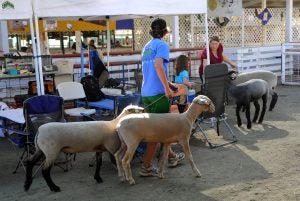Not everyone is lucky enough to grow up with agriculture in their lives. With 98 percent of Americans being removed from the farm, it’s no wonder that modern farming practices become controversial so easily. In order to address these controversies, we, as farmers, need to look at ourselves first.
For many families outside of ag, the only real-life connection they get to our world happens once or twice a year at the state or county fair.
Parents pushing kids in strollers, elderly people roaming the barns, and young teens trying to pet every animal can be seen every day at these events. If you are taking animals to the public, the questions and stares are unavoidable.
Something that agriculturalists have to realize is that the majority of the people at the fair are not familiar with modern practices, and many can find those techniques off-putting or scary. Think about it as if you had no context to what was going on: a rope around an animal’s head, a jacket on a sheep in the summer heat, putting a cow’s head into a metal frame and tying it there, and pulling a goat by the neck can all look terrifying, especially if the animal looks uncomfortable or is making noises.
Some of the simplest questions that people at the fair have asked me include: Why are there flies on your lamb? Why does this cow have poop on her butt? Why did that pig push over her water bowl? Does that goat need brushed (while pointing at a Rambouillet sheep)?
As agriculturalists, it is easy to fall into the trap of thinking that the public should trust us, simply because we know what we are doing; but food is such a deeply personal topic to people. It is what we put into our bodies, and everyone wants the best. So, when something looks different than they had imagined it would, many people go to extremes to protect themselves and their families.

Below are eight of my favorite ways to talk to people about agricultural animals:
- When you are at the fair, brushing, feeding, watering, or generally hanging out with your animal, offer to let people pet it (if safe, or course). Ask parents if their kids would like to, especially if the kid is a little bit older.
- If you notice someone stopping to look, offer to answer any of their questions. Most people won’t go up to you and ask a question, but if you lead them to it, they will most likely have a few.
- If your animal has a name, strike up a conversation by saying, “Bessy seems to like you,” or some other version of that. If your animal doesn’t have a name, make one up, call them a generic nickname, or call them by their tag number.
- If there is a kid present, offer to let them name the animal.
- When asked a question about something controversial, if you feel confident to talk on the subject, be honest, but not overly detailed. Very few Americans don’t know what TMR or DUNF means, so replace industry words and phrases with common ones. As long as the information is the same, they really don’t need to know the lingo. Remember: Just because someone isn’t from a farm doesn’t mean they can’t smell bull.
- If you find yourself less than confident in answering a question, admit it. You can say, “I don’t know a whole lot on that subject, but I can help you find someone who does.” People will respect you, and by extension, farmers generally, if you are forthright about the holes in your knowledge.
- It goes without saying that animals should be kept as humanely as possible at all times, but a good presentation is extra important at the fair. While there, you are the face of farmers to people with no other context. You represent all of agriculture to them. Kept your aisle swept, your animal clean, and always have fly spray on hand.
- If you are confronted by someone who is belligerent, or doesn’t seem to have honest intentions, remember that you are not obligated to speak to anyone. A common tactic for animal-rights activists is to pretend to be a reporter or a generally interested person, but will ask leading questions to make you say something that sounds bad out of context.
Using easier phrases and breaking information down is difficult and takes practice, but in this day and age, everyone is a communicator. Whether you like it or not, everyone has a voice, including those who have no clue about farming. However, you have a voice, too. Use it.
Jessy Woodworth is a graduate of The Ohio State University, where she studied agricultural communication and animal sciences.



